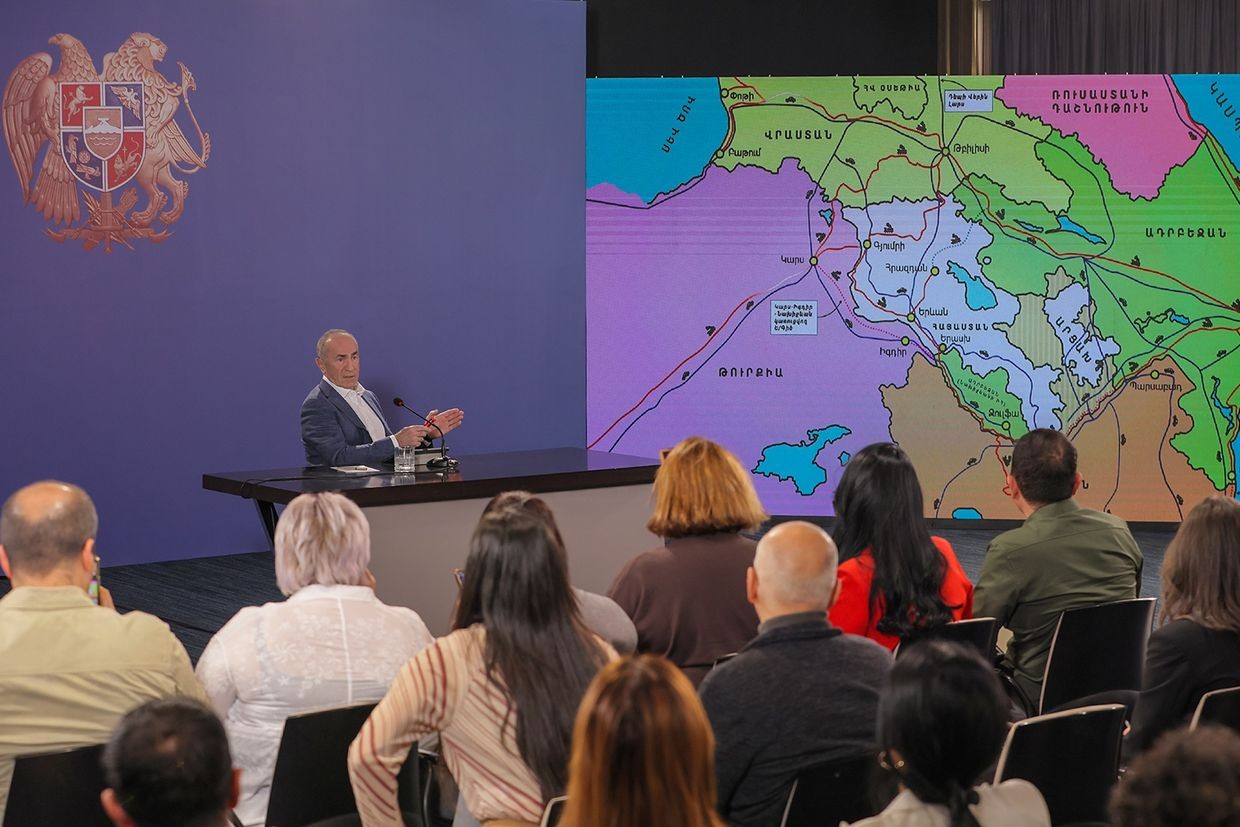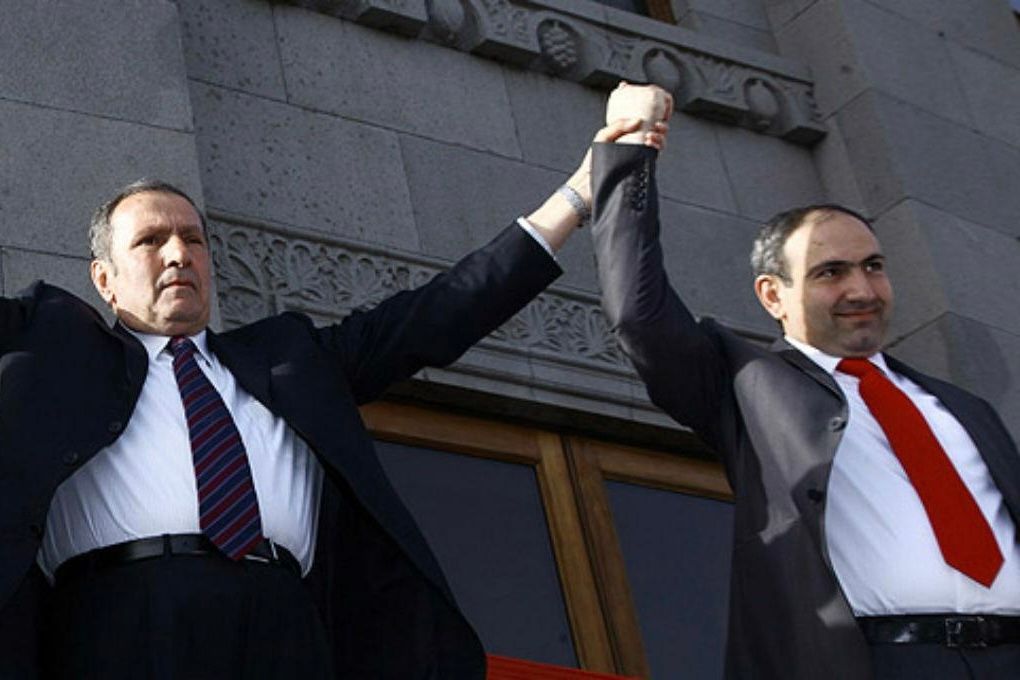Kocharyan returns to politics, claims Pashinyan has ‘zero chance’ of re-election

Former Armenian President Robert Kocharyan has announced his political comeback with sharp criticism of Prime Minister Nikol Pashinyan and his government, alleging that Pashinyan does not have a chance to win the 2026 parliamentary elections.
The chances of Pashinyan’s re-election are ‘zero’, Kocharyan stated on Tuesday, adding that two political groups together will receive more votes than Pashinyan’s Civil Contract. He said the two political parties in power will be his Armenia Alliance and a new party that Russian–Armenian billionaire Samvel Karapetyan is forming now.
Kocharyan also stated that Armenia has derived no tangible benefits from a deal signed in Washington in August. The agreement included the initialling of a peace agreement with Azerbaijan and plans for a US-managed route connecting Azerbaijan with its exclave of Nakhchivan through Armenian territory, known as the Trump Route.
‘This agreement gave Armenia nothing but problems’, Kocharyan said. ‘The US gained oversight over a transit corridor and de facto monitoring of the Armenian–Iranian border. Azerbaijan gained a transit corridor, the dissolution of the OSCE Minsk Group, and the repeal of [the US ban on weapon supplies to Azerbaijan]. Armenia gained nothing’.

Kocharyan’s criticism extended to what he described as the superficial nature of the accord. He dismissed Pashinyan’s gains as ‘a solitary photograph with President Trump’s signature, a document devoid of legal authority’, adding that Pashinyan was ‘merely a tool in the White House’. Regarding the peace treaty currently under negotiation with Azerbaijan, Kocharyan warned that ‘if it lacks guarantors, it is just a piece of paper meant for elections, not for peace’.
Kocharyan also said that the ‘loss of [Nagorno-Karabakh]’ in 2020 was the result not only of Azerbaijani military action but also of what he described as Armenia’s betrayal of Russia. He argued that Moscow was unwilling to intervene militarily for an ally that had shifted its geopolitical vector away from Russia at a critical moment.
‘Would any of you jump into a fight for a friend who has betrayed you? I don’t think so,’ he said, urging Armenians to ‘stop resenting Russians’ and understand Moscow’s perspective.
Kocharyan previously suggested the idea of a union-state with Russia during the election campaign in 2021, urging for deeper integration with Russia.

In his Tuesday speech, Kocharyan also criticised Armenia’s European policy, calling the country’s EU integration process ‘an imitation’ with ‘zero prospect’ of membership.
‘There is no European integration, but there is a department’, he said, referring to the Foreign Ministry’s European integration office. He warned that by attempting to align with a ‘weakening centre [the EU] while distancing ourselves from a strengthening one [Russia]’, Armenia risks undermining its sovereignty in an unstable global context.
Kocharyan also commented on the nature of peace negotiations with Azerbaijan, stating that a lasting settlement requires international guarantors to ensure compliance.
‘I am not against peace’, he said, ‘but peace without guarantors is just a ceasefire dependent on one person’s whim’, referring to Azerbaijani President Ilham Aliyev.
When speaking about the peace process, Kocharyan had a map of Nagorno-Karabakh on the screen, which included the seven surrounding regions captured by the Armenian forces during the first Nagorno-Karabakh War in the early 1990s. Kocharyan and his allies have described the handover of these regions after the 2020 war as a concession by the Armenian side.
He further claimed that Pashinyan is dividing Armenia.
‘[Nagorno-Karabakh — let’s give it to Aliyev, whatever [Turkish President Recep Tayyip] Erdoğan wants — let’s give it to Aliyev. Tomorrow [French President Emmanuel] Macron will say something, Trump will say something. This person is working like Mother Teresa at Armenia’s expense. That’s the impression’, he said.
Kocharyan also spoke about the current government’s handling of domestic affairs, from poverty to corruption, claiming that the country has not seen any improvement since the 2018 Velvet Revolution. He suggested that Pashinyan’s leadership style resembles 'a kindergarten or a psychiatric hospital’, accusing the government of mismanaging critical state functions and undermining Armenia’s strategic security.
'Fortunately, he was not born a girl; he would have been a national disgrace’, he added.
Kocharyan’s statements come amidst ongoing legal and political battles. In August 2025, Armenian authorities moved to confiscate $1.7 million from Kocharyan and other former officials as compensation for families of victims killed during post-election protests in 2008. The European Court of Human Rights (ECHR) ruled that Armenia had violated the victims’ rights during the crackdown. Kocharyan has consistently argued that these legal actions are politically motivated and that the ruling does not directly implicate him.
Despite these challenges, Kocharyan confirmed that his political alliance intends to contest the 2026 parliamentary elections.

Supporters view him as a stabilising figure who prioritised national interests and maintained strong ties with Russia, while critics highlight authoritarian tendencies and human rights violations, particularly in relation to the 2008 crackdown. His recent remarks illustrate that these divisions continue to shape Armenian political discourse.










